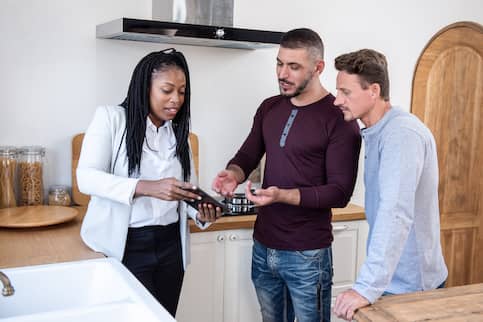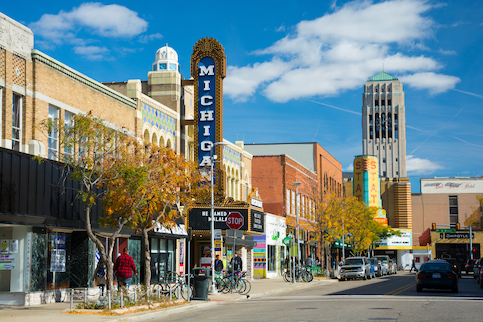Hunting for a new home or selling your existing one can be a far from simple task. If you’re buying, you’ll need to determine the right neighborhoods to search, calculate a budget to make sure you can afford your new mortgage payment and tour possibly dozens of homes before you find the right property.
And if you’re selling? You’ll need to market your home to the widest pool of possible buyers, calculate the right asking price and clean out clutter, excess furniture and personal items to make your home look as inviting as possible.
It can all be overwhelming. That’s why it makes sense to work with a REALTOR® who knows your market and the neighborhoods in which you want to buy. This real estate professional can ease much of the stress involved with buying or selling a home.
But what questions should you ask your REALTOR® to make the selling or buying processes move smoothly? Here are some suggestions depending on whether you’re a seller, buyer or both.
What It’s Like To Work With A REALTOR®
Should you hire a REALTOR® or real estate agent to help you buy or sell a home? You might use these terms interchangeably, but there is a difference between the two.
A real estate agent is a professional who has taken the required state training and passed a real estate exam to earn a real estate license. Once they have their licenses, real estate agents can help buyers purchase a home and owners sell one.
A REALTOR® is a real estate agent who is also a member of the National Association ofREALTORS® (NAR). These agents pledge to uphold the ethical guidelines of the association. Think of it as taking one additional step: You must first become a real estate agent before you can then become a REALTOR®.
These professionals can help you find the neighborhoods that fit your needs, take you through homes for sale, and make sure you don’t overpay. They’ll help you make an offer on the home and then lead negotiations if the owners counter.
If you’re selling, these professionals will list your home on the multiple listing service (MLS) and market it to potential buyers. They’ll also help you prepare your home for showings and will lead you work through negotiations with buyers.
Finding the right real estate agent orREALTOR® who knows your market is a key to successfully buying or selling your home.
But how do you find the perfect representative? It’s all about asking the right questions.
See What You Qualify For
Buy A Home
Discover mortgage options that fit your unique financial needs.

Refinance
Refinance your mortgage to have more money for what matters.
Tap Into Equity
Use your home’s equity and unlock cash to achieve your goals.
13 Questions To Ask A Real Estate Professional When Selling A Home Or Buying One
Here are the key questions to ask to help you find a good REALTOR® or real estate agent.
1. Are You A Full-Time Agent?
Full-time professionals can dedicate their time entirely to marketing homes for sale or searching for homes, depending on their clients. But not all REALTORS® work on a full-time basis. Many consider selling homes a part-time side hustle.
Selling a home requires marketing the home, entertaining offers and helping you stage your home for showings. Meanwhile, buying a home requires searching listings, setting up tours and negotiating with sellers. You may not receive the same level of service with someone who is juggling these responsibilities with a full-time job. However, this will depend on the time management skills and motivation of the REALTOR®.
Think about your needs when buying or selling. You may want someone who is solely focused on the real estate market, who can devote their full attention to you. If you require constant communication and are stressed about the buying or selling of your home, a full time professional may ease concerns.
2. Do You Have Referrals I Can See?
Successful REALTORS® can often claim a long list of satisfied clients. When you’re interviewing professionals, ask for referrals from past clients. Once you have that list, contact as many clients as you’d like to ask about their experience working with the REALTOR®.
3. How Much Do You Charge?
Most home sellers will pay 6% of the sale price to buyer’s and seller’s agents. If your home sells for $350,000, you’ll pay around $21,000 in commission. This is usually paid for from the profits of the sale.
The seller pays commission, but the seller’s agent doesn’t keep that whole commission. They usually split it with the agent representing the home’s buyers, with both agents typically receiving 3% of the total sales price. For that $350,000 home sale, then, the seller’s agent would receive a final commission of $10,500, while the buyer’s agent would receive an equal amount.
4. Do You Work With Home Buyers And Sellers?
If you’re selling a home, it’s best to work with a seller’s agent who will only represent your interests. You don’t want your agent also representing the buyers of your home. And vice versa if you’re the buyer. Why? This agent won’t fight to get you the highest price or lowest price – depending on if you’re the buyer or seller – if they are also trying to negotiate with the other party.
There is nothing wrong with working with a REALTOR® who represents both buyers and sellers. Just make sure their other clients aren’t the ones you have to negotiate with. Again, your REALTOR® won’t be able to provide fair representation to both you and the other party.
5. How Long Have You Been A REALTOR®?
Experience can be a positive for REALTORS®. Real estate professionals with several years of experience know the right price for a home. They know how to negotiate, find homes and how to market a home to the deepest possible pool of buyers.
But if you find a REALTOR® whom you like who doesn’t have years of experience, that can be OK, too. REALTORs® new to the market might be hungry to prove themselves. They might also be working with a lower number of clients, meaning that they can devote more attention to your home sale.
6. Do You Have A Team?
Some agents work with a team of fellow REALTORS® and assistants to maximize their time. This often happens with experienced professionals who have built a large client base. If your REALTOR® has a team, you’ll typically meet with multiple people throughout the process, maybe even more often than you meet with your REALTOR®. If you prefer to work with one person throughout the process, you’ll likely want to choose a REALTOR® who works alone, without a team.
Ready for a change?
Find top-rated movers and compare multiple quotes on HomeAdvisor.
7. What Is Your Usual Availability? What Is The Best Way To Reach You?
It’s not fair to expect your REALTOR® to be available for your calls, texts or email messages 24 hours a day. But it does make sense to ask them how long it takes to respond to questions and whether they’re willing to meet with you in the evenings or on weekends.
Make sure to ask about how they communicate, too. Some prefer phone calls, while others rely more heavily on texts or emails. Make sure that you are comfortable with whatever approach they take.
8. How Many Homes Did You Help Sell In The Past Year?
Ask how many homes they sold for their clients last year. This, after all, is the ultimate measure of success of a REALTOR®. If the number seems too low, you might consider looking for a different person to work with.
9. What Is Your Average List-Price-To-Sales-Price Ratio?
A home’s listing price is often significantly different from the final sales price. Knowing their average list-price-to-sales-price ratio will indicate how well they negotiate.
If you’re a seller, you want a seller’s agent who consistently closes deals in which the sales price is close to the original listing price. Most buyers will make an offer below a home’s listing price. But you don’t want to work with someone whose clients are consistently accepting offers that are tens of thousands of dollars below listing price.
If you’re a buyer, you want a buyer’s agent who is good at getting deals for their clients. If they consistently get homes for below the asking price, they may be able to get you a better price, too.
10. How Many Clients Do You Work With At A Time?
Successful real estate professionals typically work with more than one client at a time. They’d struggle to earn a living if they didn’t. But be wary about working with a REALTOR® who has too many clients. They might be too busy to give your home sale the attention it deserves.
There is no magic number of clients. But if a REALTOR® is juggling more than 10 clients, you might not receive the one-on-one service you want.
11. Have You Sold Homes In This Area Before?
It’s important to know how many homes a REALTOR®® sold last year. But it’s even more important to know how many they sold in your neighborhood. Every community is different. REALTORS® who understand your area, and have had success selling in it, are more likely to sell your home or find you a new one at the best price.
12. Can You Make Recommendations To Increase The Selling Price?
If you’re a seller, your REALTOR® might be able to recommend some home improvements that could boost your home’s selling price and make it more likely your home will sell quickly. This includes updates to your home’s kitchen and bathrooms. Your REALTOR® might provide ideas on how you can boost your property’s curb appeal, something that can help your home make a strong first impression on possible buyers.
If you’re a buyer, they’ll know what improvements the seller has made to add value to the home and may help you make a better offer based on the improvements – or lack thereof.
13. How Will You Market My Home?
When you sell, one of your REALTOR®’s biggest jobs is to market your home to the deepest pool of possible buyers. This typically involves listing your home on the MLS at a price that will attract the most buyers without undervaluing your property. They also are responsible for holding open houses, networking with fellow real estate agents, creating virtual tours of your property and developing custom web sites highlighting your home’s top features. As a buyer, your question will be more like, “How will you find my home?” Your REALTOR® should be aware of all of these marketing techniques and use them to find your home.
See What You Qualify For
You can get a real, customizable mortgage solution based on your unique financial situation.
7 Questions To Ask A REALTOR® When Buying A House
When you’re buying your dream home, there are additional questions to ask. Your REALTOR® should have knowledge of the home and area and be able to answer these important questions.
1. How Old Is The Roof?
Replacing a roof isn’t cheap and usually costs thousands of dollars. It’s important to know the exact condition of a roof before buying a house. Get as many details as possible, including:
- Type of roof: Roofs come in several different styles and are made from different materials. Make sure you know what the maintenance costs of your new home’s roof might be and how likely it is that your roof will suffer serious damages from hail, wind or other natural forces.
- General condition: You can ask about any noticeable damage to a roof. During your home inspection – which takes place after you make an offer that the sellers accept – a home inspector will take a closer look at the roof, letting you know if it has suffered any costly damage.
- Age: How old is the roof?
- Recent repairs: Has the roof undergone any maintenance recently? Are there receipts detailing what was done and how much it cost?
- Chimney: A chimney that has not been properly maintained can cause plenty of costly safety issues. Ask to see any documents listing regular maintenance. Make sure, too, that your home inspector examines the home’s chimney for any signs of damage or past fires. If a fire has occurred, it could threaten the chimney’s structural stability and the chimney may need to be replaced.
2. What Do We Need To Know About Utility Systems?
It’s not easy or inexpensive to repair or install a new heater, cooling unit, pipes, water heater or insulation. That’s why it’s important to ask your REALTOR® about:
- Electrical: What is the rate of the electricity flow in the house? This is also called amperage, how many amps a house has. A modern house should have anywhere from 100A to 200A. Older homes may have as little as 60A. The more systems you plan to run at the same time (central air, TVs, computers, microwaves, etc.), the more amps you’ll need to power those devices. You should also ask about the average monthly electricity costs for your new home.
- Plumbing: Do the faucets work properly? Ask your REALTOR® to show you the water flow from each faucet in the house. Drips or leaks can be expensive. How old is the hot water heater, and what is the size? What materials are the pipes made of? Has anything been repaired recently? Is everything up to the current code?
- Water service: Make sure the home’s water and sewer services are working properly. Ask whether the home has a sump pump and if the home has ever flooded.
- Heating: What type of heat is available? Oil, electric, steam, baseboard combination, forced natural gas and a heat pump are all possibilities. Find out the age of the systems and if any recent repairs have been done.
3. Is The Home Energy-Efficient?
Owning a home can be expensive, with a general rule of thumb stating that you should budget from 1% to 4% of the home’s value for annual maintenance and repair costs. It’s important, then, to save as much money as you can after buying a home. One way to do this? By lowering your energy bills.
That’s why you should ask your REALTOR® about the energy costs you’ll be taking on after buying your new home. A home that is energy-efficient can help reduce your monthly energy bills, a benefit to your budget.
Ask your REALTOR® about:
- Energy-efficient features: What energy-efficient features does the home have? These may include solar panels, specialty appliances and smart home systems.
- Feature upkeep: Efficiency is great, but will you have to spend big dollars on maintaining these energy-efficient features?
- Location-dependent tax credits: Can you take advantage of location-dependent energy tax credits as a reward for investing in energy-efficient appliances and other features?
4. What Can We Expect To Pay In Monthly Utilities?
You can expect to pay more for your monthly utility bills when the weather is hot or the temperatures dip toward freezing. Ask your agent how much the home’s current owners pay each month for utilities. And make sure the sellers show you utility bills from the height of the summer and winter, too, so that you can get an accurate estimation of how high these bills might rise.
5. What Is This Neighborhood Like?
You’re not just buying a home. You’re becoming part of a neighborhood. It makes sense, then, to ask your REALTOR® for key information about the good and bad qualities of the neighborhoods you’re considering.
- Schools: Schools play a major role in the value of homes. Even if you don’t plan on having children or your older children have already aged out of the public school system, you’ll want to ask your REALTOR® about the strength of local public schools. They should be able to steer you toward any online report cards or other measures of the quality of local schools.
- Crime: Another key factor when considering a home? The neighborhood’s safety. Ask about how much crime takes place in and near the neighborhood you’re considering. Again, your REALTOR® should be able to point you toward any online sources of crime stats for your neighborhood.
- Lifestyle: Are you looking for a quiet neighborhood in which to raise a family? Maybe you’re an empty nester looking for a community dotted with restaurants, local theaters and shops. Or maybe you’re a young couple without children. You might prefer buying in a neighborhood within walking distance of bars, night clubs and trendy restaurants. You want to buy in a neighborhood that matches your lifestyle preferences. Ask if the neighborhood you’re considering is a good fit.
6. What Is The History Of The Home?
Researching the history of a home can uncover any potential red flags. If you search the records of your local tax office, you might find that its past owners skipped several property tax bills. You might also discover that the property was distressed or abandoned in the past, which could mean that the home’s upkeep was neglected. Ask your REALTOR® about any known negatives in the home’s past.
7. What Are The HOA Fees?
Not all homes come with homeowners association costs (HOA fees). But if you’re buying a condominium unit, a home within a planned housing subdivision or a property in a gated community? You might have to pay this monthly fee.
HOA fees are charged by a homeowners association for the maintenance and upkeep of a condominium building’s or subdivision’s public areas. These include such places as lobbies, gardens, swimming pools and recreation centers. The fees also help pay for any planned repairs or improvements. If your subdivision’s swimming pool needs expensive patches, your homeowners association might fund it by either issuing a special assessment – a temporary hike in your HOA fees – or by dipping into the reserves created by monthly HOA fees.
It’s important to find out from your REALTOR® how much you’ll be paying in HOA fees each month. You should also ask about any recent special assessments and whether the homeowners association is planning to levy any new assessments in the coming months.
Take the first step to buy a home.
Quicken Loans® lets you get to house hunting sooner.
FAQs About Working With A REALTOR®
Have questions about working with a REALTOR®? Here are some answers:
Can I change real estate agents or REALTORS®?
If you’re not happy with your real estate agent or REALTOR®, you can change your representation. Be aware, though, that this could be more difficult if you signed a contract. If you signed a contract with either your seller’s or buyer’s agent, it might be more difficult to switch. Most contracts, though, will list a specific amount of time – often 6 months – before the contract expires.
What should I do before meeting with a REALTOR®?
Before meeting with a REALTOR® for the first time, compile a list of goals that you want out of the relationship. If you’re selling a home, you might want your agent to help you with staging your home, weeding out unserious offers, negotiating final sales prices and marketing your home to a deep pool of potential buyers. Make sure you’re clear about which services you’d like your seller’s agent to provide. Come to your REALTOR® with a price that you hope to nab for your home, too. They might not agree with your assessment, but it’s important for you and your REALTOR® to agree on a target sales price and understand expectations beforehand.
If you’re buying, make sure to come armed with information on the neighborhoods in which you’d like to buy, the budget you have for a new home, the type of home you’d prefer and any deadlines you need to meet for your move.
Can I negotiate a real estate agent’s commission?
You can always try to negotiate a lower real estate agent commission. Remember, though, real estate professionals live on commission. Most are not eager to accept a lower commission structure. And if they do, they might not provide all the services that are provided when they’re working for the standard 6% commission – such as help with staging a home, negotiating final contracts or recommending inspectors and real estate attorneys.
The Bottom Line: The Right REALTOR® Can Set You Up With Your Dream Home
Finding the right REALTOR® is a key part of buying a home or selling one. A REALTOR® who understands your goals and needs is a key ally as you search for the right property and neighborhood or aim to sell for the best price. If you’re ready to buy a home, finding an agent is a good first step. So is getting approved for a mortgage.

Dan Rafter
Dan Rafter has been writing about personal finance for more than 15 years. He's written for publications such as The Washington Post, Chicago Tribune and Wise Bread.












